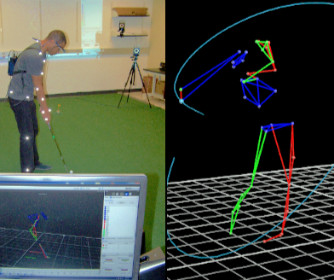UTSA Human Performance Laboratory helps athletes reach peak performance

UTSA professor, students studying the science of sports, human athleticism (Photo courtesy: UTSA Human Performance Laboratory)
(Nov. 14, 2016) -- Action: The athlete swings his golf club. Effect: A golf ball rolls to one end of the room. In the seconds before and after the action and its effect, six specialized cameras capture the motions of the athlete, the club and the ball.
Nearby, William Land, assistant professor of kinesiology at The University of Texas at San Antonio (UTSA) watches as real-time, three-dimensional representations of each appear on his computer monitors and on the large projection wall at the back of the laboratory.
This is the UTSA Human Performance Laboratory. In it, Land and his graduate student assistants are working on understanding the cognitive and psychological factors that influence human movement, athleticism and–as the name suggests—performance.
"Fundamentally, humans move to bring about desired effects and outcomes in the environment. Athletes in particular train very hard to ensure their movements produce consistent effects,” said Land, who is an expert in sports psychology, attention and focus, and athletes choking under pressure.
According to Land, professional athletes excel at developing cognitive techniques for producing consistent motion such as anticipating the desired effects and outcomes of a skill. After extensive practice, the movements to produce those effects, like scoring a basket or pitching a ball, become almost automatic and require significantly less mental effort to do correctly.
Currently, Land is engaged in two ongoing research studies with a group of UTSA graduate students who assist him in the laboratory. The first project deals with figuring out how the relationships between a subject’s actions and its consequences can be used to improve learning and performance. The second study aims to understand how what someone is thinking about, also known as “attentional focusing,” can translate into greater accuracy during movement and performance.
In order to better understand and visualize these concepts, the UTSA laboratory is home to a variety of specialized equipment designed to assist in Land’s research. The technology includes motion capture equipment and cameras, Doppler software and hardware that can track movement in the air, and visual occlusion glasses that can manipulate a subject’s vision at the researchers’ wills.
“Through our state-of-the-art equipment and set-up, we can manipulate everything from visual to aural feedback and see in real-time the changes in subjects’ performances,” said Land. “It really helps us get a sense of how human cognition drives the body in performing actions, and this knowledge is important for facilitating training and learning of motor skills.”
Though Land and his assistants conduct their research using athletic performance as their main frame of reference, Land imagines their findings and research can be translated into other contexts, too.
“Every day, we’re finding new applications for our work,” said Land. “I can easily see our work being used to help in physical therapy and rehabilitation to improve patients’ motions, for example, and we are beginning to make exploratory efforts into seeing the applications available there.”
UTSA is ranked among the top 400 universities in the world and among the top 100 in the nation, according to Times Higher Education.
---------------Learn more about the UTSA College of Education and Human Development and the UTSA Human Performance Lab.
Connect online at Facebook, Twitter, YouTube and Instagram.
Events
Join the PEACE Center and Wellbeing Services for Denim Day, a day of learning about the importance of consent and why we wear denim on the last Wednesday of the month each April during Sexual Assault Awareness Month. Stop by our Denim Day display to take a photo in front of our Denim Wall, spin the "Is It Consent?" Wheel, and get a Concha or goodie.
Student Union Window Lounge, Main CampusLearn to use Zotero®, a citation manager that can help you store and organize citations you find during your research. Zotero can generate bibliographies in various styles, insert in-text citations and allow you to share sources with collaborators.
Virtual EventThis event will acknowledge graduating seniors from the McNair Scholars program at UTSA before inducting the new cohort of scholars into the program.
North Paseo Building (NPB 5.140), Main CampusAt this memorable celebration, UTSA graduates will be introduced one-by-one to cross the stage and accept their doctoral degrees.
Arts Building Recital Hall, Main CampusRoadrunner Walk is an event for graduating students to have a memorable walk on campus to celebrate an important milestone and their achievements. Graduates will walk along the Paseo while being celebrated by the UTSA community, friends, and family members.
Student Union Paseo, Main CampusCelebrate the accomplishments of College of Education and Human Development, College for Health, Community and Policy, College of Sciences and University College.
Alamodome, 100 Montana St.Celebrate the accomplishments of Alvarez College of Business, College of Liberal and Fine Arts and Klesse College of Engineering and Integrated Design.
Alamodome, 100 Montana St.

